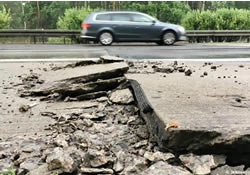GERMANY
 One of Germany’s most influential commentators says Chancellor, Angela Merkel’s unexpected difficulties in getting to the G20 Summit in Buenos Aires revealed “a telling tale of more widespread dysfunction in the country’s public sector”.
One of Germany’s most influential commentators says Chancellor, Angela Merkel’s unexpected difficulties in getting to the G20 Summit in Buenos Aires revealed “a telling tale of more widespread dysfunction in the country’s public sector”.
Executive Director of the Maecenata Foundation, a Berlin-based think tank, Dr Rupert Strachwitz said Ms Merkel’s German Air Force plane developed a technical fault, forcing her to continue her journey on a commercial flight.
“Where the tale turns into the bizarre dimension is that the German Government and its armed forces should be able to deliver their boss — occasionally described as the most powerful woman on Earth — and her delegation to an important international conference on time, even if there was a hitch,” Dr Strachwitz said.
“A second Government plane was available, but no second crew, while labour regulations forbade the first crew switching to the second plane.”
He said the incident highlighted two connected problems Germany was facing: first, the country’s infrastructure was in an appalling state; second, the Public Service was too set in its ways.
Dr Strachwitz said PS employees were more interested in creating mountains of rules and regulations, and less in providing services.
“Meanwhile, Germany’s providers of infrastructure services cannot shake a reputation for poor service at high prices,” he said.
“They mainly excel in making excuses for themselves.”
Dr Strachwitz said Deutsche Bahn (the state railway company), Deutsche Post (the postal service), Deutsche Telekom (the state telephone company) and Lufthansa (the national air carrier), not to mention the social security system and other Government Agencies, provided examples of this.
Berlin’s new airport, operated by a Government-owned company specially set up for the purpose, was due to open in 2012.
At best, it should now be operational in 2020.
Dr Strachwitz said Germany’s once famous autobahns (pictured) were in a constant state of disrepair and overburdened with traffic.
“Even one of the new buildings for the Bundestag in Berlin may have to be pulled down before it is actually finished, as groundwater coming in apparently cannot be stopped,” Dr Strachwitz said.
He said while German civil society was increasingly vibrant, the same could not be said for the public sector.
“Generally speaking, it is neither efficient nor citizen or business-friendly, with many of its staff adopting an attitude that combines high-handedness and inertia,” Dr Strachwitz said.
Berlin, 4 December 2018











